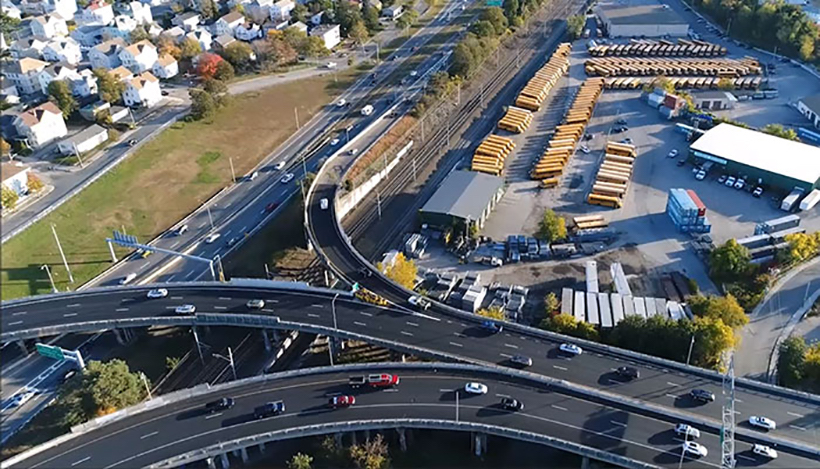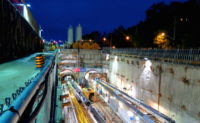Rhode Island's First-Ever Infrastructure Report Delivers Mixed Marks

The results of the first-ever infrastructure report card for Rhode Island are in, with the coastal state winning a passing grade from the American Society of Civil Engineers. But it was not exactly with flying colors, with the Rhode Island chapter of the ASCE handing out a C- to the Ocean State due to decades of underinvestment in its roads and bridges.
On the plus side, Rhode Island has been beefing up spending on its roadways since 2016, when the state pushed ahead with the $5-billion RhodeWorks program, aimed at bringing the state’s transportation infrastructure up to grade by 2025. However, the Rhode Island Dept. of transportation has pegged more than $378 million in road repairs for which it currently has no funding, while “Rhode Island’s share of rural roads in poor condition is ranked as the highest in the nation,” the report notes.
The Rhode Island report card, as well as other ASCE state and regional infrastructure report cards, are modeled after the ASCE’s national report card. By comparison, the ASCE gave a gave out a D+ to the nation’s infrastructure in 2017.
“In these trying times, the importance of our state’s infrastructure is clearer than ever,” said Nazifa Sarawat, chair of the 2020 Report Card for Rhode Island's Infrastructure. “It means our infrastructure is in mediocre condition and requires attention.”
The ASCE report assesses seven key categories of infrastructure in the state, handing out the lowest grades to bridges (D-) and roads (D).
Nearly a quarter of Rhode Island’s 779 bridges were deemed structurally deficient in 2019, with 117 having posted load restrictions.
The poor conditions are the result of a combination of “underinvestment” combined with the “wear and tear of de-icing agents” that are a fact of life on New England roadways during the winter. “Our bridges are in desperate need of help,” Sarawat said.
The condition of Rhode Island’s drinking water and wastewater treatment plants earned mediocre grades, pulling a C+ and C, respectively.
The largest water treatment plant in New England, Providence Water, has pumped $460 million into capital improvements over the past 14 years, including 86 miles of new pipes.
However, Providence Water says portions of the housing stock within its retail distribution network is nearly a century old, and a lot of these homes still have lead service pipes and plumbing. As such, Providence Water, says it has struggled to be below limits set for lead by the EPA.
The state’s wastewater treatment plants are also in need of an upgrade. The plants have an average age of 69, and pipes in Providence, Central Falls and Pawtucket are a century old on average.
Meanwhile, climate change expected to raise serious challenges to the coastal state’s infrastructure as a whole, with sea levels expected to rise by 10 ft by the end of the century.
A seven-foot rise would pose a threat to 90 bridges across the state and 573 miles of coastline, the report noted.
“Rhode Island is one of the oldest states in the nation and, as a result, our infrastructure faces many challenges," said Sarawat, in a press release. "Severe weather events and our location as a coastal state only add to the burden. If we want to use taxpayer funds efficiently and proactively ensure public safety, we must ensure that our systems are properly maintained and prepared for imminent sea level rise, harsh winters and increasingly severe storms."
The ASCE also noted some bright spots as well in its survey of Rhode Island’s infrastructure.
Rail infrastructure earned a B-, the highest grade given out in the report, with the addition in recent years of high-speed rail, the expansion of commuter rail service, and an overhaul of older freight lines.
Rhode Island also won a better grade for its energy infrastructure, pulling a C+. The state set a goal to have its entire electricity load handled by renewable energy by 2030, while Rhode Island’s per capita energy consumption is among the lowest in the country.
The state also has the nation’s first off-shore wind farm.
Still, Rhode Island’s gas lines are in need of an upgrade, with 44% now over 50 years old, the report card notes.
In order to pull up its infrastructure grade, Rhode Island will need to continue to support its RhodeWorks repair and maintenance program, boost in-state capacity for the generation of electricity, boost multimodal freight and other connections to the state’s ports, and further develop climate resiliency plans, the report recommends.
"Infrastructure fuels Rhode Island's economy, but our systems are aging rapidly and require more investment to keep up with future needs," Rhode Island Lt. Governor Dan McKee said in a statement.



